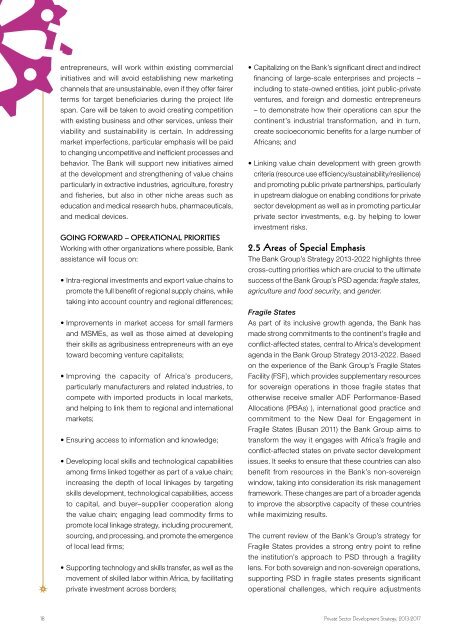2013-2017_-_Private_Sector_Development_Strategy
2013-2017_-_Private_Sector_Development_Strategy
2013-2017_-_Private_Sector_Development_Strategy
You also want an ePaper? Increase the reach of your titles
YUMPU automatically turns print PDFs into web optimized ePapers that Google loves.
entrepreneurs, will work within existing commercial<br />
initiatives and will avoid establishing new marketing<br />
channels that are unsustainable, even if they offer fairer<br />
terms for target beneficiaries during the project life<br />
span. Care will be taken to avoid creating competition<br />
with existing business and other services, unless their<br />
viability and sustainability is certain. In addressing<br />
market imperfections, particular emphasis will be paid<br />
to changing uncompetitive and inefficient processes and<br />
behavior. The Bank will support new initiatives aimed<br />
at the development and strengthening of value chains<br />
particularly in extractive industries, agriculture, forestry<br />
and fisheries, but also in other niche areas such as<br />
education and medical research hubs, pharmaceuticals,<br />
and medical devices.<br />
Going Forward – Operational Priorities<br />
Working with other organizations where possible, Bank<br />
assistance will focus on:<br />
• Intra-regional investments and export value chains to<br />
promote the full benefit of regional supply chains, while<br />
taking into account country and regional differences;<br />
• Improvements in market access for small farmers<br />
and MSMEs, as well as those aimed at developing<br />
their skills as agribusiness entrepreneurs with an eye<br />
toward becoming venture capitalists;<br />
• Improving the capacity of Africa’s producers,<br />
particularly manufacturers and related industries, to<br />
compete with imported products in local markets,<br />
and helping to link them to regional and international<br />
markets;<br />
• Ensuring access to information and knowledge;<br />
• Developing local skills and technological capabilities<br />
among firms linked together as part of a value chain;<br />
increasing the depth of local linkages by targeting<br />
skills development, technological capabilities, access<br />
to capital, and buyer–supplier cooperation along<br />
the value chain; engaging lead commodity firms to<br />
promote local linkage strategy, including procurement,<br />
sourcing, and processing, and promote the emergence<br />
of local lead firms;<br />
• Supporting technology and skills transfer, as well as the<br />
movement of skilled labor within Africa, by facilitating<br />
private investment across borders;<br />
• Capitalizing on the Bank’s significant direct and indirect<br />
financing of large-scale enterprises and projects –<br />
including to state-owned entities, joint public-private<br />
ventures, and foreign and domestic entrepreneurs<br />
– to demonstrate how their operations can spur the<br />
continent’s industrial transformation, and in turn,<br />
create socioeconomic benefits for a large number of<br />
Africans; and<br />
• Linking value chain development with green growth<br />
criteria (resource use efficiency/sustainability/resilience)<br />
and promoting public private partnerships, particularly<br />
in upstream dialogue on enabling conditions for private<br />
sector development as well as in promoting particular<br />
private sector investments, e.g. by helping to lower<br />
investment risks.<br />
2.5 Areas of Special Emphasis<br />
The Bank Group’s <strong>Strategy</strong> <strong>2013</strong>-2022 highlights three<br />
cross-cutting priorities which are crucial to the ultimate<br />
success of the Bank Group’s PSD agenda: fragile states,<br />
agriculture and food security, and gender.<br />
Fragile States<br />
As part of its inclusive growth agenda, the Bank has<br />
made strong commitments to the continent’s fragile and<br />
conflict-affected states, central to Africa’s development<br />
agenda in the Bank Group <strong>Strategy</strong> <strong>2013</strong>-2022. Based<br />
on the experience of the Bank Group’s Fragile States<br />
Facility (FSF), which provides supplementary resources<br />
for sovereign operations in those fragile states that<br />
otherwise receive smaller ADF Performance-Based<br />
Allocations (PBAs) ), international good practice and<br />
commitment to the New Deal for Engagement in<br />
Fragile States (Busan 2011) the Bank Group aims to<br />
transform the way it engages with Africa’s fragile and<br />
conflict-affected states on private sector development<br />
issues. It seeks to ensure that these countries can also<br />
benefit from resources in the Bank’s non-sovereign<br />
window, taking into consideration its risk management<br />
framework. These changes are part of a broader agenda<br />
to improve the absorptive capacity of these countries<br />
while maximizing results.<br />
The current review of the Bank’s Group’s strategy for<br />
Fragile States provides a strong entry point to refine<br />
the institution’s approach to PSD through a fragility<br />
lens. For both sovereign and non-sovereign operations,<br />
supporting PSD in fragile states presents significant<br />
operational challenges, which require adjustments<br />
18 <strong>Private</strong> <strong>Sector</strong> <strong>Development</strong> <strong>Strategy</strong>, <strong>2013</strong>-<strong>2017</strong>


